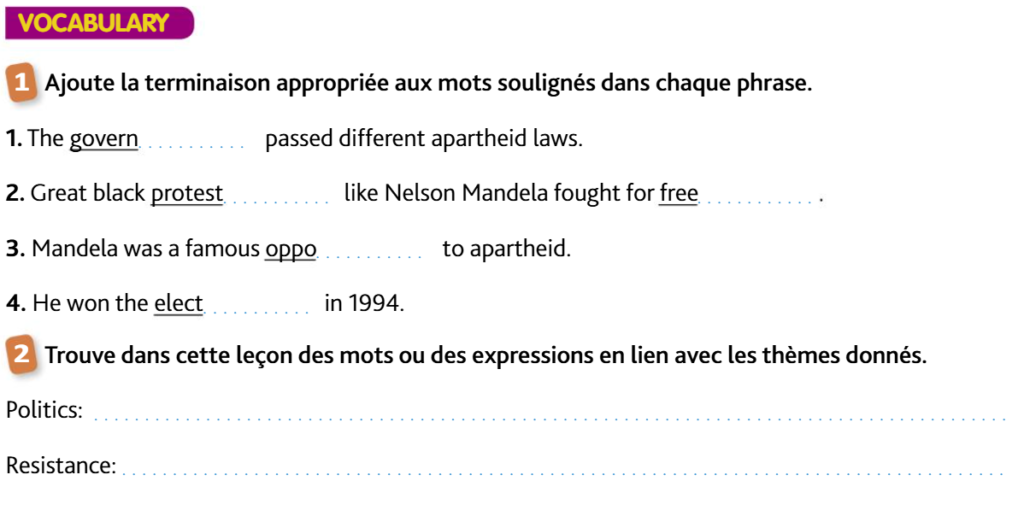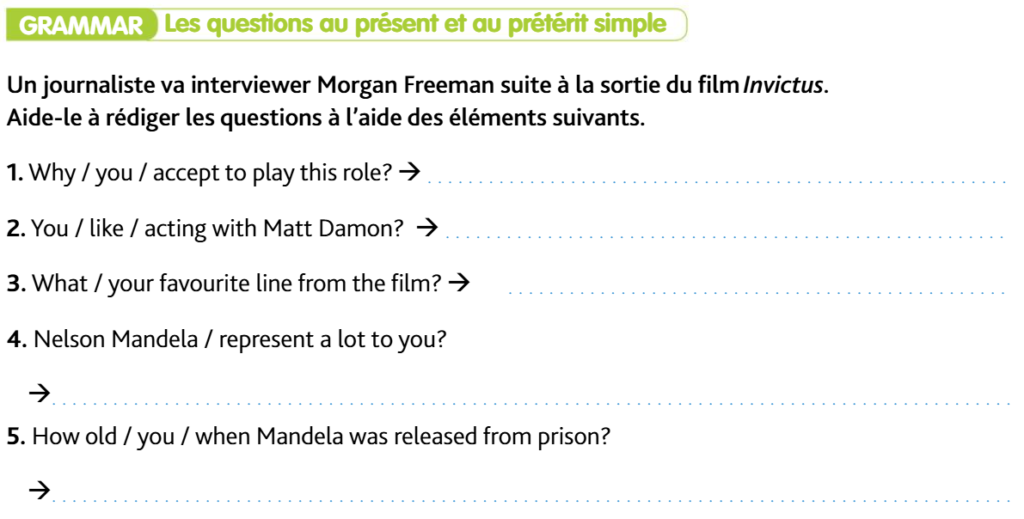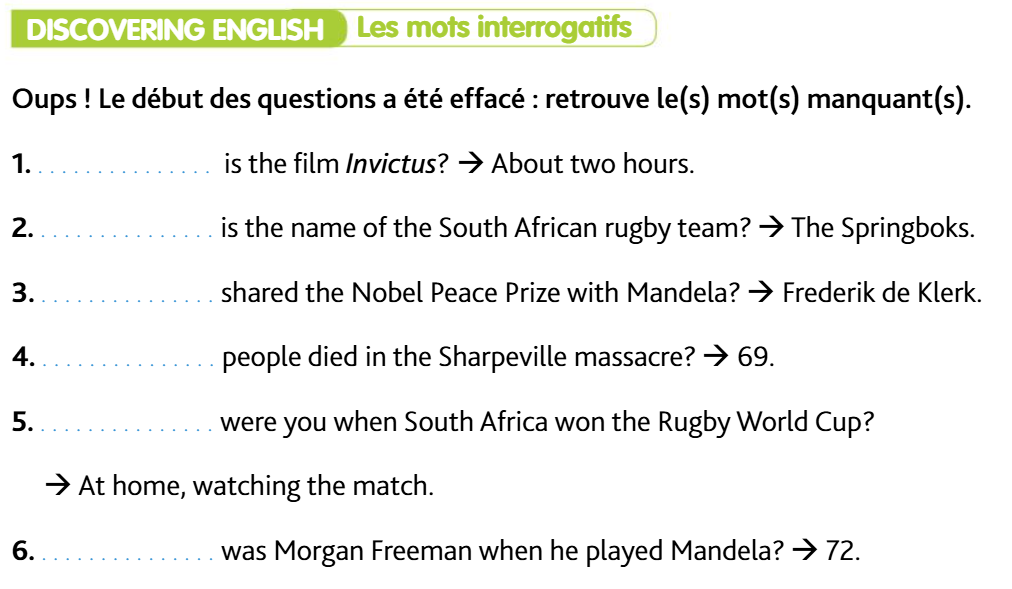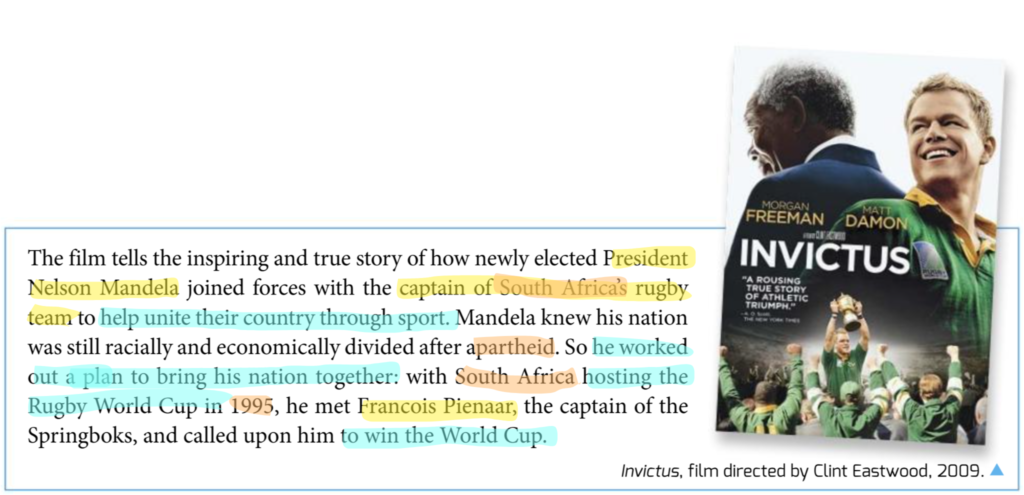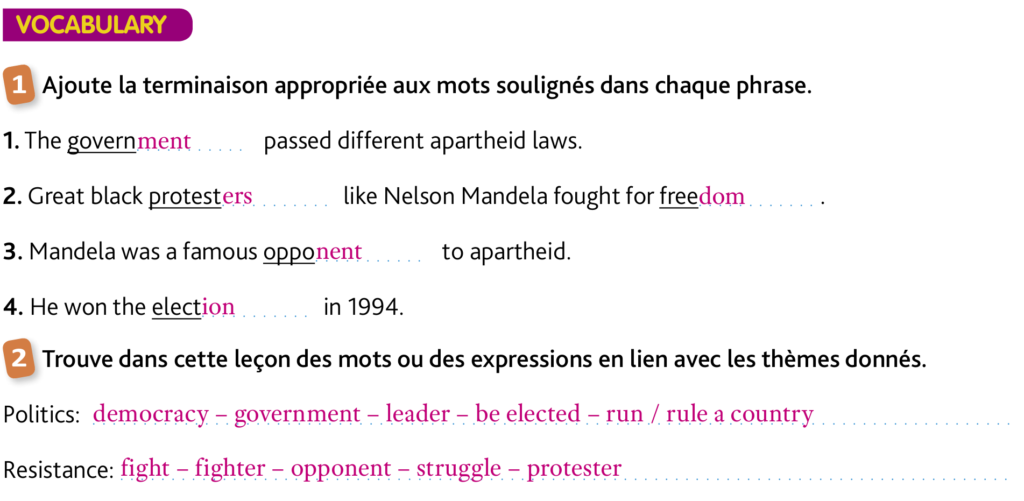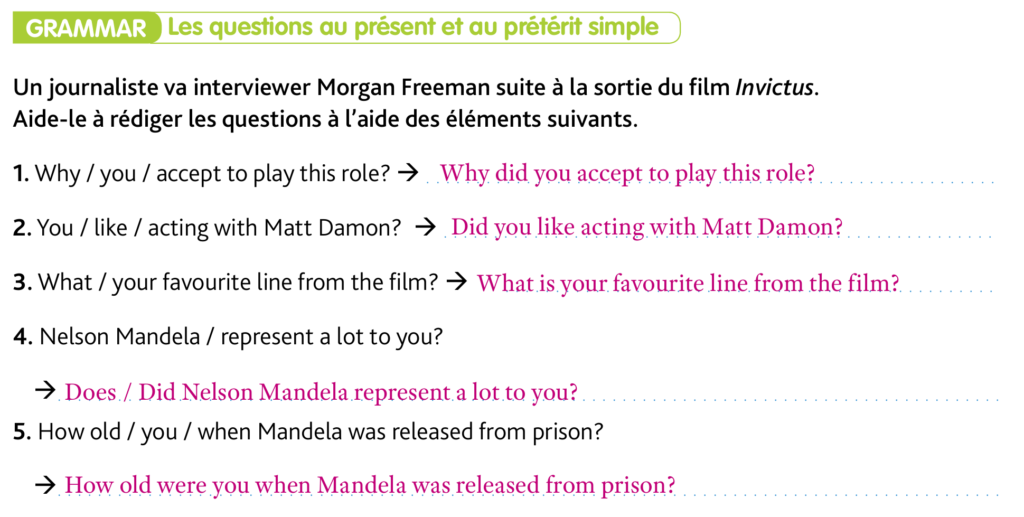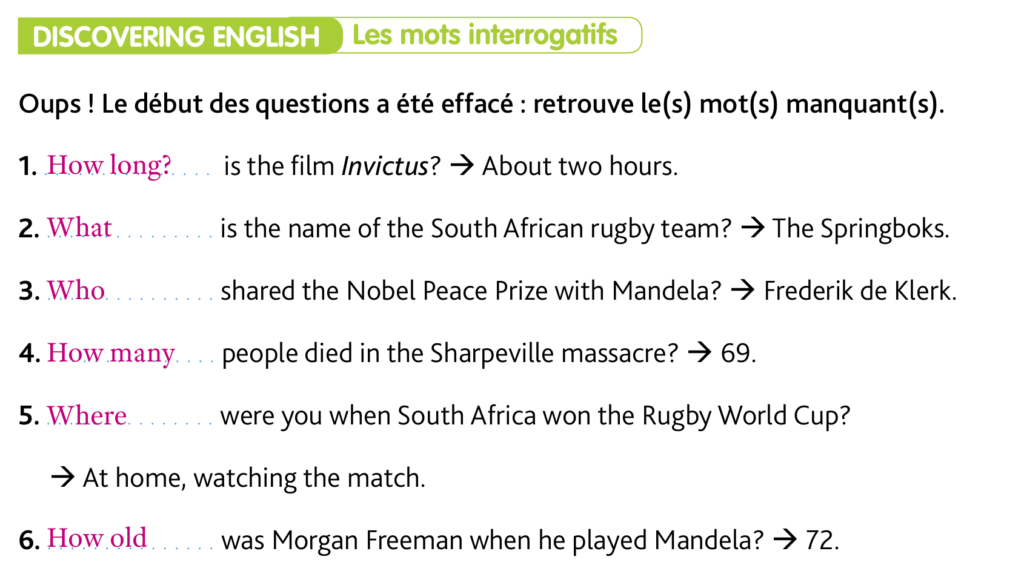A long walk to freedom
Objectif de communication
- comprendre, demander et donner des renseignements biographiques
Objectifs linguistiques
- les questions au prétérit simple
- l’intonation des questions
- le vocabulaire de la thématique (activism and politics)
Contents
Apartheid - When discimination is law
- Nouveau vocabulaire : Apartheid et discrimination
- Compréhension d’image et de texte : BD Timeliners
- Compréhension audio : Comprendre l’apartheid
- Expression écrite : Court journal intime
Vocabulary Kit
Key Vocabulary
- Apartheid = Apartheid
- Segregation = Ségrégation
- Racial = Racial(e)
- Discrimination = Discrimination
- Government = Gouvernement
- Strict = Strict(e)
- Neighborhood = Quartier
- Opponent = Opposant(e)
- Right (legal) = Droit
- Protest = Protester / Manifestation
- Protester = Manifestant(e)
- Unfair = Injuste
More Advanced Words
- Election = Élection
- Law = Loi
- Leader = Leader / Dirigeant(e)
- Prison = Prison
- Vote = Vote / Voter
- End (verb) = Mettre fin à
- Freedom = Liberté
- Human rights = Droits de l’homme
- Oppression = Oppression
- Inequality = Inégalité
- Justice = Justice
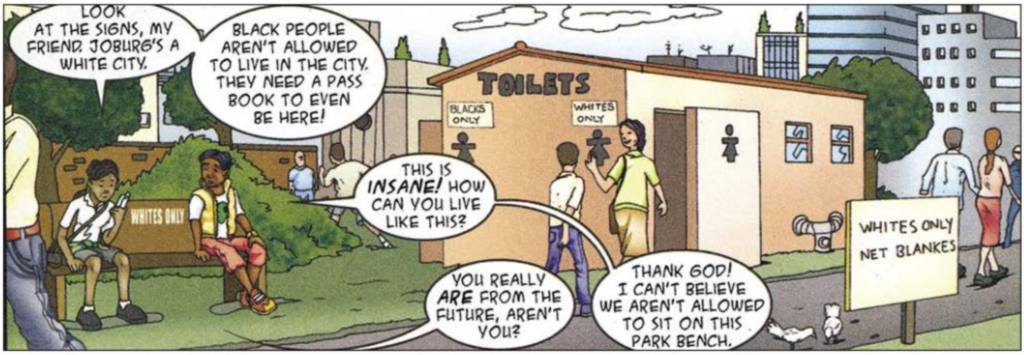
1. Observe and React
Neo is a South African boy who lives in Jozi in the 2000s. One day he travels back in time and finds himself in Joburg, South Africa, in 1976.
Look at the comic strip. Identify and read the different signs and inscriptions. What do you understand about life in Johannesburg in 1976?
- What do the signs tell us about society at the time?
- How does this situation make you feel?
- How would you react if you were in Neo’s position?
Possible Answers: Observe and React
Observations from the comic strip:
- Signs like « Whites Only » and « Blacks Only » → Indicate racial segregation and discrimination.
- Neo’s shocked reaction → Shows that this situation is shocking to someone from the future.
- The need for a passbook → Highlights the restrictions placed on Black people’s movement.
- Separate toilets for different races → Demonstrates enforced social division.
- The contrast between characters → Some see segregation as normal, while Neo is outraged.
Personal Reactions:
- « I find it shocking that people were separated in every aspect of life. »
- « It’s unfair and cruel that people were treated differently based on their skin color. »
- « I can’t imagine living in a society where I don’t have the same rights as others. »
2. Analyze the Speech Balloons
Read the speech bubbles and find the elements describing life in Johannesburg in 1976.
- Identify what Neo says and highlight his reactions.
- Find one adjective that best describes Neo’s reaction.
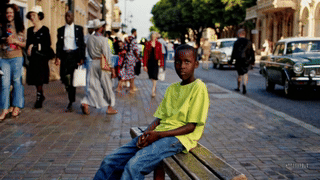
Possible Answers: Speech Balloons Analysis
Highlighted elements describing life in Johannesburg in 1976:
- « Black people aren’t allowed to live in the city. They need a passbook to even be here! » → This shows racial segregation and restrictions on movement.
- « Whites only » / « Blacks only » signs → Indicate systemic discrimination in public spaces.
- « This is insane! How can you live like this? » → Neo’s reaction shows disbelief and frustration.
- « Thank God! I can’t believe we aren’t allowed to sit on this park bench. » → Highlights the absurdity of segregation.
- « You really are from the future, aren’t you? » → Suggests that for those living in apartheid, this level of discrimination was seen as ‘normal.’
One adjective to describe Neo’s reaction: Shocked / Outraged / Disbelieving
3. Understanding Apartheid
Listen and explain what apartheid was. You can copy important information from the audio, or explain in your own words.
Prepare to read your text to the rest of the class.
Apartheid was a system of racial segregation in South Africa between 1948 and 1991. The government made strict laws separating white and Black people. They could not go to the same schools, live in the same neighborhoods, or even use the same buses. Black South Africans had fewer rights and could not vote. Many people protested against this unfair system. One of the most famous leaders was Nelson Mandela. He was sent to prison for 27 years because he fought against Apartheid. In 1994, Apartheid ended, and Mandela became the first Black president of South Africa.
Culture Box
Apartheid, qui se prononce /əˈpɑː.teɪt/, est à l’origine un mot afrikaans (langue germanique issue du néerlandais) signifiant « séparation, mise à part ».
Trucs et Astuces
Pour vérifier le sens d’un mot, pense à utiliser des dictionnaires en ligne, par exemple :
Final Task
Imagine that you are Neo, traveling back in time to 1976. Write a short diary entry expressing your thoughts and emotions after experiencing apartheid firsthand.
Nelson Mandela - Struggle and Triumph
- Vocabulaire : Activisme et politique
- Compréhension d’image : Nelson Mandela
- Compréhension orale : La biographie de Nelson Mandela
- Recherche et organisation des dates clés
- Expression écrite : Une lettre à Nelson Mandela
Vocabulary Kit
Activism and Politics
- Run = Diriger un pays
- Struggle = Lutter
- Join a movement = Rejoindre un mouvement
- Be elected = Être élu
- Release = Libérer
Trucs et Astuces
N’essaie pas de tout comprendre dans le document, mais concentre-toi sur les mots accentués et utilise les photos pour deviner quels mots tu risques d’entendre.
1. Observe and Guess
Look at the photo of Nelson Mandela. Discuss these questions with your classmates:
- Who do you think he is?
- Where do you think he is in the photo? Why?
- What kind of life do you think he had?
Write down your guesses. Then, listen to the biography and check your answers.
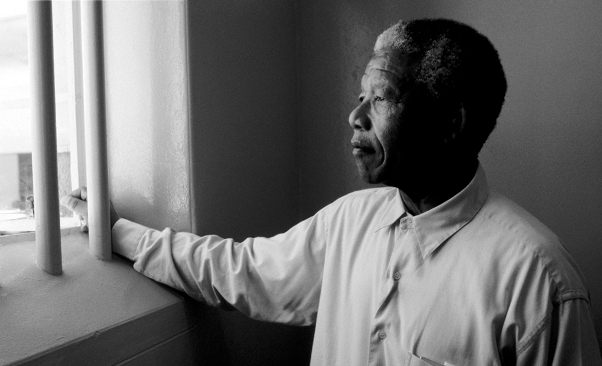
After serving 27 years in prison, Nelson Mandela helped end apartheid in South Africa and became his country’s first democratically elected president.
Born in South Africa’s Cape Province on July 18, 1918, Nelson Mandela joined the African National Congress (ANC) Youth League in 1942 and directed active civil disobedience against the South African government. Mandela was an active opponent of apartheid.
After the 1960 Sharpeville massacre, where police killed 69 and wounded 180 unarmed protesters, Mandela became more militant. Three years later, in 1963, Mandela and ten others were sentenced to life in prison for sabotage and conspiracy to overthrow the government. During his incarceration, Mandela gained international attention.
On February 11, 1990, South African president de Klerk released Mandela from prison. Three years later, both men were awarded the Nobel Peace Prize for their work on ending apartheid. On May 10, 1994, at the age of 77, Mandela was elected President of South Africa.
Nelson Mandela passed away on December 5, 2013, at the age of 95.
2. Listening Task
Listen to the biography of Nelson Mandela. While listening, write down all the numbers and dates you hear.
Tip: Focus on important words, names, and key events:
- 18th of July, 1918 → Nelson Mandela was born in South Africa’s Cape Province.
- 1942 →
- 1960 →
- …
- 18th of July, 1918 → Nelson Mandela was born in South Africa’s Cape Province.
- 1942 → Mandela joined the African National Congress (ANC) Youth League.
- 1960 → Sharpeville Massacre: Police killed 69 protesters, making Mandela more militant.
- 1963 → Mandela was arrested for sabotage and conspiracy.
- 1990 → Mandela was released from prison after 27 years.
- 1993 → Mandela and South African president de Klerk received the Nobel Peace Prize.
- 10th of May, 1994 → Mandela became the first Black president of South Africa.
- 5th of December, 2013 → Mandela passed away at the age of 95.
3. Organizing Key Events
Now, listen again and answer the following questions.
- How long was Mandela in prison?
- When was he released?
- When did he become President?
- When did he receive the Nobel Peace Prize?
- When was he born?
- When did he pass away?
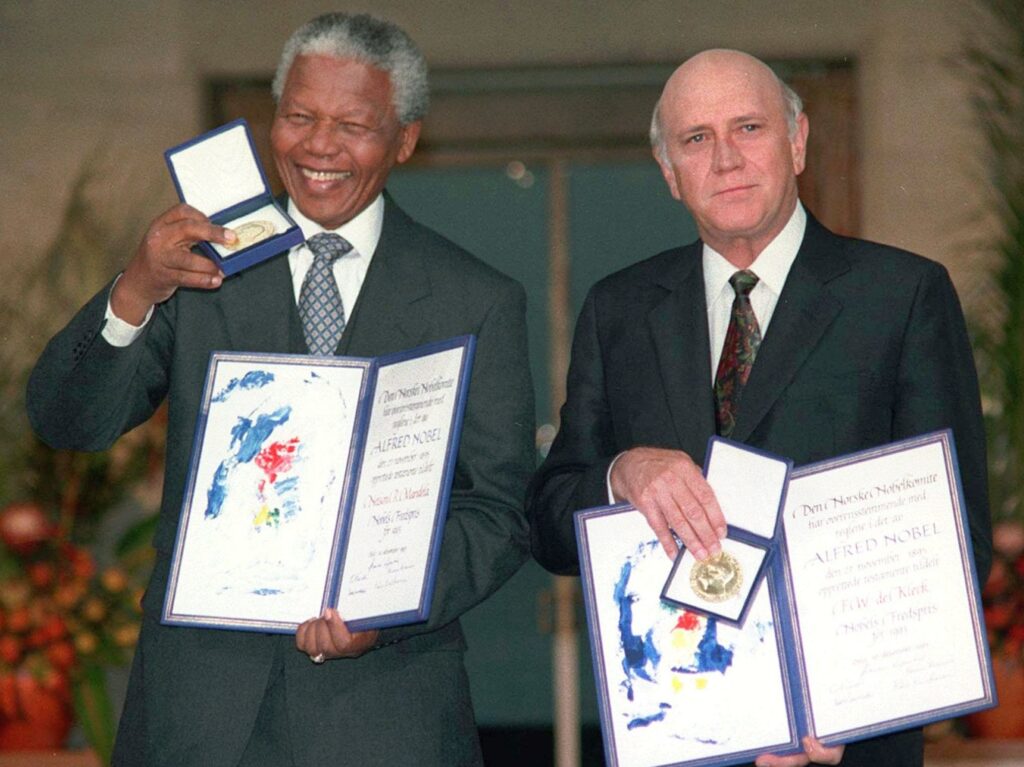
- How long was Mandela in prison? 27 years
- When was he released? 11th of February, 1990
- When did he become President? 10th of May, 1994
- When did he receive the Nobel Peace Prize? 1993
- When was he born? 18th of July, 1918
- When did he pass away? 5th of December, 2013
4. Discussion: Why Was Nelson Mandela Famous?
With your classmates, recap the main events of Mandela’s life. Discuss:
- What made Mandela an important figure?
- How did he change South Africa?
- What can we learn from his story?
Prepare to share your ideas with the class.
Final Task
Imagine you could write a letter to Nelson Mandela. What would you say to him?
100 mots / 30 mins
Guiding Questions:
- What do you admire most about him?
- What questions would you ask?
- How has his story inspired you?
Les mots interrogatifs
- Vocabulaire : Mots interrogatifs
- Identifier les mots interrogatifs dans une question
1. Say the question words
Listen carefully to the questions and say the question words aloud.
- How old was Nelson Mandela when he went to prison?
- Where was he born?
- When did he join the ANC?
- How much do you know about Mandela?
- Who played Nelson Mandela?
- How long did he stay in prison?
- Why did he go to prison?
- What was the ANC?
- How many wives did he have?
- What was his clan name?
- How did he become famous?
2. Copy and complete the table
| Poser une question sur… | Mot / Expression |
|---|---|
| qui | ………………….. |
| que / quoi / quel | ………………….. |
| quand | ………………….. |
| où | ………………….. |
| l’âge | ………………….. |
| la quantité | ………………….. |
| la longueur | ………………….. |
| la cause | ………………….. |
| comment | ………………….. |
| Poser une question sur… | Mot / Expression |
|---|---|
| qui | who |
| que / quoi / quel | what |
| quand | when |
| où | where |
| l’âge | how old |
| la quantité | how much / how many |
| la longueur | how long |
| la cause | why |
| comment | how |
Les questions au présent et au prétérit simple
- Former des questions avec le verbe Be
- Former des questions avec l’auxiliaire Do
- Interrogation sur le sujet
1. Questions with the Verb Be
Copy and underline the verb be in red and the subject in green.
- Why is he famous?
- Were there any black players in the Springboks?
- How old was he when he became president?

- Why is he famous?
- Were there any black players in the Springboks?
- How old was he when he became president?
Grammar Kit : Les questions avec be
- Pour former une question avec le verbe be au présent ou au prétérit simple, on utilise/n’utilise pas l’auxiliaire do.
- Comme be est aussi / n’est pas un auxiliaire, il se suffit / ne se suffit pas à lui-même.
- L’ordre des mots :
(mot ________ +) ________ conjugué + ________ (+ compléments) ?
- Pour former une question avec le verbe be au présent ou au prétérit simple, on n’utilise pas l’auxiliaire do.
- Comme be est aussi un auxiliaire, il se suffit à lui-même.
- L’ordre des mots :
(mot interrogatif +) verbe conjugué + sujet (+ compléments) ?
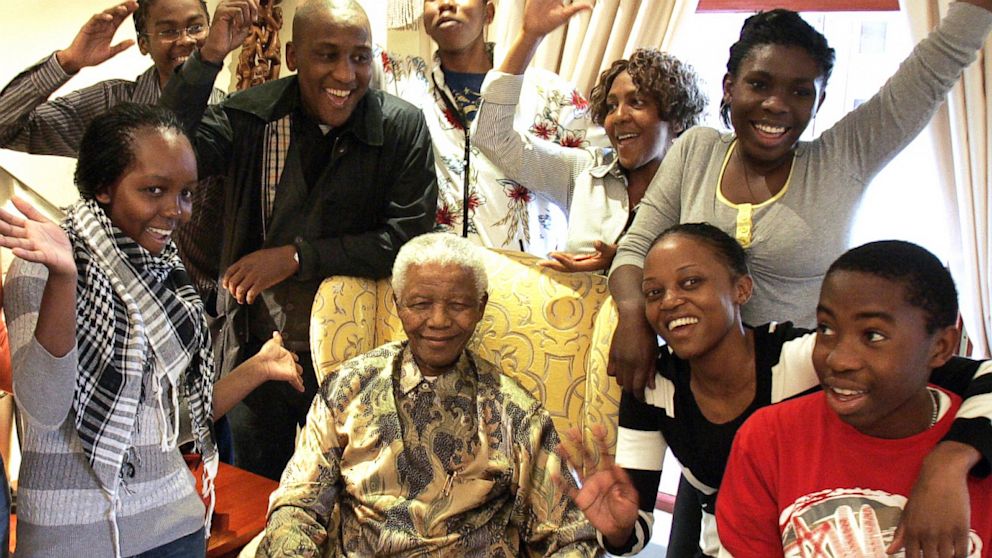
2. Questions with Auxiliary Do
Copy and underline the verb in red, the auxiliary in blue, and the subject in green. Underline the question words.
- Does he have any children?
- When did he get elected president?
- Did he live under apartheid?
- What did he do?
- Does he have any children?
- When did he get elected president?
- Did he live under apartheid?
- What did he do?
Grammar Kit : Les questions avec l’auxiliaire do
- Pour former une question au présent ou au prétérit simple, on utilise l’auxiliaire ________.
- C’est lui qui est conjugué : ________ au présent simple et ________ au prétérit simple.
- Le verbe est conjugué / sous forme de base verbale.
- L’ordre des mots :
(mot ________ +) auxiliaire ________ conjugué + ________ + ________ (+ compléments) ?
- Pour former une question au présent ou au prétérit simple, on utilise l’auxiliaire do.
- C’est lui qui est conjugué : do / does au présent simple et did au prétérit simple.
- Le verbe est sous forme de base verbale.
- L’ordre des mots :
(mot interrogatif +) auxiliaire do conjugué + sujet + BV (+ compléments) ?
3. Subject Questions
Copy and underline the verb in red and the subject in green.
- Who released Nelson Mandela from prison?
- What happened in 1960 in Sharpeville?
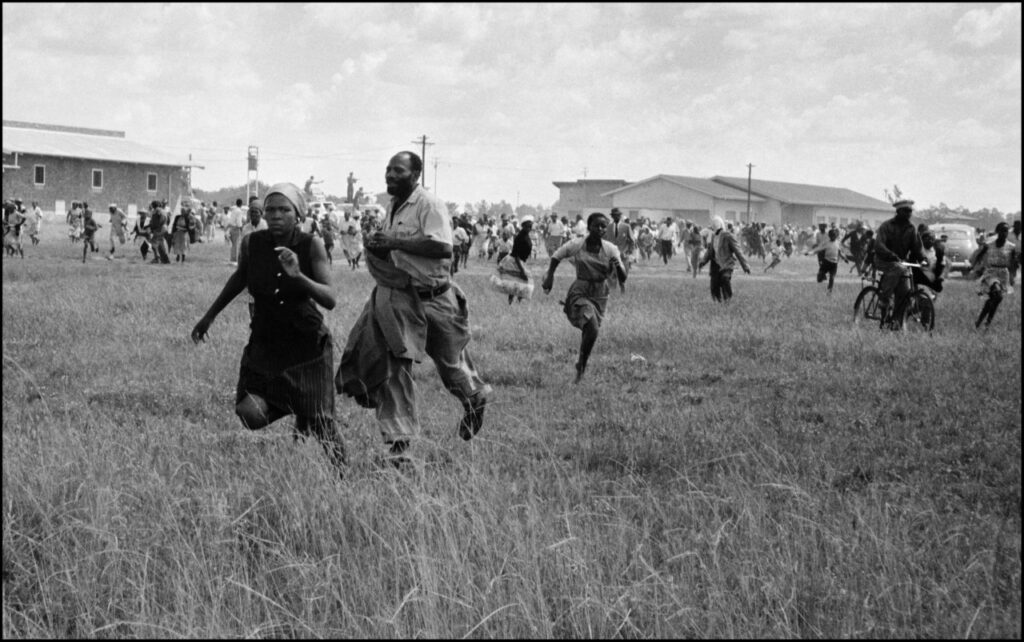
- Who released Nelson Mandela from prison?
- What happened in 1960 in Sharpeville?
Grammar Kit : Interrogation sur le sujet
- Lorsque le mot interrogatif est le ________ du verbe, on n’utilise pas l’auxiliaire ________.
- L’ordre des mots :
mot ________ + ________ conjugué (+ complément) ?
- Lorsque le mot interrogatif est le sujet du verbe, on n’utilise pas l’auxiliaire do.
- L’ordre des mots :
mot interrogatif + verbe conjugué (+ complément) ?
4. Complète le tableau récapitulatif.
| Si le verbe est be : | Pour tous les autres verbes : | Si le mot interrogatif est le sujet : |
|---|---|---|
| (mot ……….. +) ……….. conjugué + ……….. (+ compléments) ? | (mot ……….. +) auxiliaire ……….. conjugué + ……….. + ……….. (+ compléments) ? | mot ……….. + ……….. conjugué (+ complément) ? |
| Si le verbe est be : | Pour tous les autres verbes : | Si le mot interrogatif est le sujet : |
|---|---|---|
| (mot interrogatif +) be conjugué + sujet (+ compléments) ? | (mot interrogatif +) auxiliaire do conjugué + sujet + BV (+ compléments) ? | mot interrogatif + verbe conjugué (+ complément) ? |
4. Word order challenge
You have 5 minutes to make as many questions as possible. How many can you complete correctly?
- famous / why / he / is
- he / was / when / born
- married / was / he
- have / children / any / he / does
- when / he / did / president / become
- who / Mandela / released / prison / from
- happened / in / Sharpeville / 1960 / what
- die / when / did / he
- he / how / in / spent / many / prison / years
- Mandela / put / who / in / prison
- he / go / did / why / prison / to
- receive / Mandela / Nobel Prize / did / a
- how / old / he / was / elected / when / president
- Mandela / when / was / released
- under / apartheid / live / he / where / did
- vote / Black / people / could
- the / what / apartheid / goal / was / of
- how / did / long / last / apartheid
- apartheid / when / end / did
- was / white / last / president / who / the
- famous / why / he / is → Why is he famous?
- he / was / when / born → When was he born?
- married / was / he → Was he married?
- have / children / any / he / does → Does he have any children?
- when / he / did / president / become → When did he become president?
- who / Mandela / released / prison / from → Who released Mandela from prison?
- happened / in / Sharpeville / 1960 / what → What happened in Sharpeville in 1960?
- die / when / did / he → When did he die?
- he / how / in / spent / many / prison / years → How many years did he spend in prison?
- Mandela / put / who / in / prison → Who put Mandela in prison?
- he / go / did / why / prison / to → Why did he go to prison?
- receive / Mandela / Nobel Prize / did / a → Did Mandela receive a Nobel Prize?
- how / old / he / was / elected / when / president → How old was he when he was elected president?
- Mandela / when / was / released → When was Mandela released?
- under / apartheid / live / he / where / did → Where did he live under apartheid?
- vote / Black / people / could → Could Black people vote?
- the / what / apartheid / goal / was / of → What was the goal of apartheid?
- how / did / long / last / apartheid → How long did apartheid last?
- apartheid / when / end / did → When did apartheid end?
- was / white / last / president / who / the → Who was the last white president?
Final Task
Complete the Past Simple Questions Evaluation
Unconquered, unsubdued, invincible
- Commentaire d’image : Affiche du film Invictus
- Qu’est-ce qu’un résumé de l’intrigue ?
- Compréhension écrite : Résumé de l’intrigue d’Invictus
- Nouveau vocabulaire
- Expression écrite : Résumé du film
- Discussion : Les événements d’Invictus
1. Look at the film poster and predict the plot.
Observe the film poster and describe what you see. Imagine what the story could be about.
- Who do you see on the poster?
- What sport is involved?
- What kind of atmosphere does the image create?
- Based on the title, what do you think Invictus means?
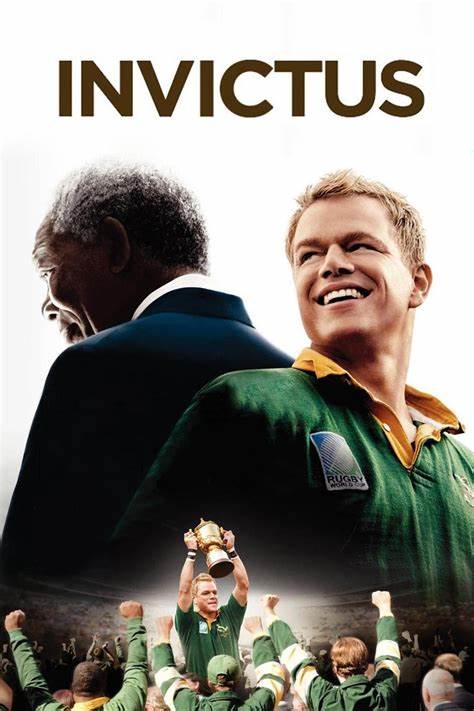
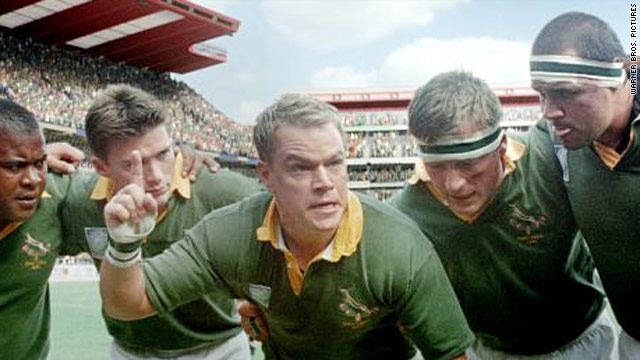
2. Copy and identify the elements of a plot summary.
A plot summary usually contains certain elements. Copy the relevant ones:
- Setting (place and time)
- Characters
- Actors
- Opinion about the film
- Storyline
- Type / Genre
A plot summary usually contains the following elements:
- Setting (place and time)
- Characters
- Storyline
3. Read the plot summary of Invictus and highlight different elements.
Use one color for each element:
- Setting – Place and time
- Characters – Who is in the story?
- Storyline – What happens in the film?
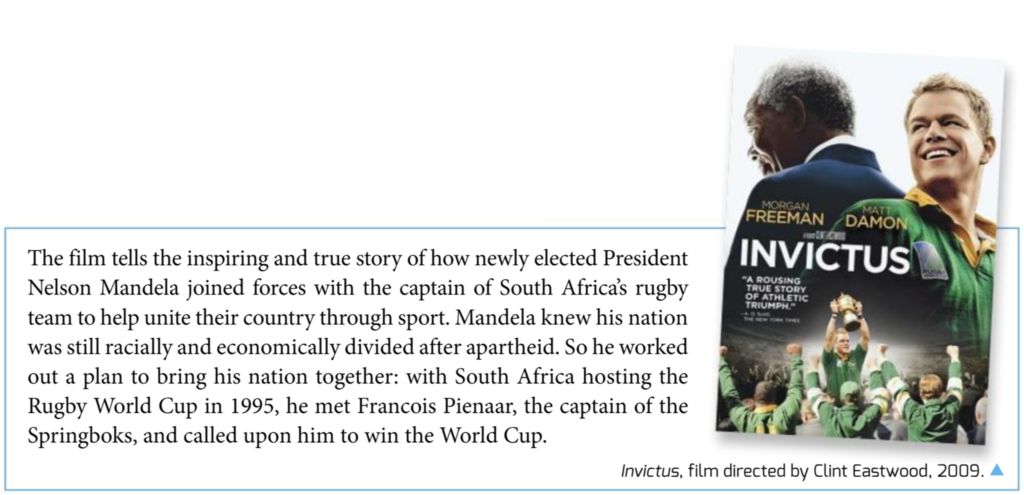
4. Guess the meaning of the words from the context.
Use the plot summary to find the meaning of these words:
- true story: ………………….
- still: ………………….
- worked out: ………………….
- bring together: ………………….
- hosting: ………………….
- called upon him: ………………….
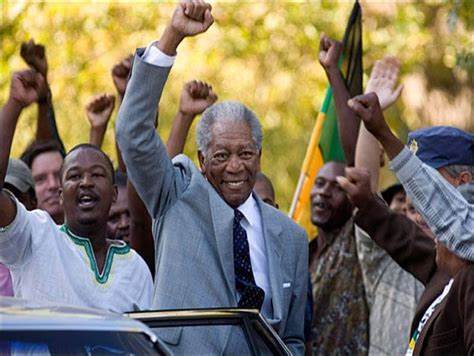
- true story → histoire vraie
- still → toujours / encore
- worked out → a élaboré / mis au point
- bring together → rassembler
- hosting → qui accueille
- called upon him → lui a demandé
5. Write a short summary of the film.
In one or two sentences, summarize what the film is about.
- 1. The film Invictus tells the true story of how Nelson Mandela, as South Africa’s first Black president, used the Rugby World Cup in 1995 to unite a divided country after apartheid.
- 2. In Invictus, newly elected President Mandela collaborates with rugby captain François Pienaar to inspire the South African team to victory, bringing the nation together through sport.
- 3. The film follows Nelson Mandela’s efforts to unite a racially divided South Africa by supporting the national rugby team in the 1995 World Cup, showing the power of leadership and sports.
Grammar Kit
The past simple is used to ask questions about past events.
- Where was he in prison?
- Did he win the election?
- Who released him from prison?
6. Group discussion
Discuss these questions in pairs or small groups:
- Why do you think Mandela chose rugby to unite his country?
- Do you think sport has the power to bring people together? Why?
- Can you think of another example where sports helped unify people?
Prepare to share your ideas with the rest of the class.
United in celebration
- Compréhension vidéo : scène d’ouverture d’Invictus
- Réactions, différences raciales
- Compréhension vidéo : scène finale d’Invictus
- Expression écrite et orale : imagine que tu étais un(e) spectateur(rice)
Culture box
Invictus, qui signifie « invaincu, invincible » en latin, est en fait le titre d’un poème de William Ernest Henley. Il s’agissait du poème préféré de Nelson Mandela.
1. Observe and Describe
Watch the opening scene of Invictus. Work in groups of four, two people turn their back to the board.
- Group A: Listen and watch the scene, explain to the other group what happens.
- Group B: Listen to the scene. Ask questions if you don’t understand something.
2. Copy and Complete the Table
Watch the opening scene again and take notes about the people and their reactions.
| White people | Black people |
|---|---|
| Who?… | Who?… |
| Place… | Place… |
| Clothes… | Clothes… |
| Activity… | Activity… |
| Feelings / Reactions… | Feelings / Reactions… |
| White people | Black people |
|---|---|
| Who? Rugby players + coach | Who? Kids |
| Place Rugby field (pitch) / green | Place Neglected field / no grass |
| Clothes Rugby jerseys + shorts | Clothes Old / torn clothes |
| Activity Play rugby | Activity Play football |
| Feelings / Reactions Stop playing – curious – annoyed – watch | Feelings / Reactions Stop playing – joyful / enthusiastic – shout Mandela’s name |
3. Listening Task
Listen carefully to the people in the scene and answer the following questions.
- Who is in the car? …………………………………
- What word does the white man use to describe this person? …………………………………
- How do the black children react? …………………………………
- What do the rugby players do? …………………………………
- Who is in the car? Nelson Mandela is in the car
- What word does the white man use to describe this person? He calls Mandela a terrorist
- How do the black children react? They are happy and excited to see Mandela
- What do the rugby players do? They stand in shock, they are disgusted
4. Discussion
Recap a partner: Compare how black and white people react in the scene. Explain how they reacted on February 11, 1990, the day of Mandela’s release.
Prepare to share your ideas with the rest of the class.
5. Take Notes on the Final Scene
Watch the final scene and take notes.
- People: ……………
- Places: ……………
- What happens? ……………
- People’s reactions and feelings: ……………
- People’s actions: ……………
5. Take Notes on the Final Scene – Answers
- People: rugby players – supporters – referee – black and white people – Nelson Mandela
- Places: Stadium – South Africa – a home – a bar
- What happens? end of the rugby match – victory of the Springboks
- People’s reactions and feelings: joyful – happy – excited
- People’s actions: smile – shout – jump – kiss each other – hug each other – wave flags
Final Task
Imagine the moment: Imagine you were a South African on June 24, 1995, and you witnessed the victory. Write a few sentences describing what you saw and how you felt.
Prepare to read your text to the rest of the class
Worksheet
- Vocabulaire
- Les questions au présent et au prétérit simple
- Les mots interrogatifs
1. Complete the Long Walk to Freedom Worksheet
